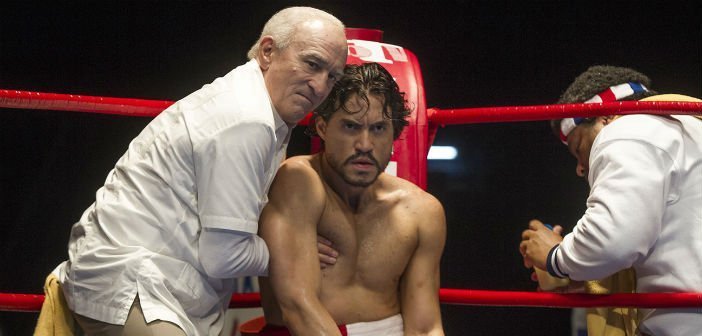The rags-to-riches story of legendary Panamanian pugilist Robert Duran has always been ripe for a Hollywood sports drama, and it finally arrives this week in the form of Hands of Stone – named for the fighter’s real-life sobriquet, which he earned by mercilessly pummeling his opponents over the course of his four-decade career. But despite the compelling nature of Duran’s rise to boxing royalty, director Jonathan Jakubowicz (who also wrote the screenplay) fails to deliver a film worthy of sharing Manos de Piedra‘s moniker.
Opening in 1971, with a 20-year-old Duran’s first-round knockout of Benny Huertas at Madison Square Garden, the film introduces us to Ray Arcel (Robert De Niro). A celebrated trainer who guided 18 different fighters to the world championship, Arcel was forced into retirement when his ambitious plans to use television as a means of expanding boxing into a nationwide attraction caused him to run afoul of the Mob. But there’s something about Duran (Edgar Ramirez) – the passion, the tenacity, the raw talent – that reminds Arcel of his glory days, and he agrees to meet with the young fighter and his manager, Carlos Eleta (Ruben Blades).
The initial encounter doesn’t exactly go well, due mostly to Duran’s loyalty to his current trainer (Pedro Perez) and his innate mistrust of Americans. A lengthy flashback tries to provide context for the chip on Duran’s shoulder – the ongoing US occupation of the Canal Zone is a key element here – and then we’re back to the present day, with Arcel and Duran training on the streets of Panama and the film providing no explanation whatsoever for this surprising turn of events. It’s the first in a long series of questionable editing choices that often make Hands of Stone feel more like a work in progress than a complete vision.

As Duran continues to hone his craft and establish himself as an unstoppable competitor, he begins trying to woo Felicidad (Ana de Armas), a gorgeous young student from a decidedly different background. Their first meeting is charming and sweet, with Duran full of swagger and braggadocio and Felicidad obviously intrigued by his rampant display of machismo – but the scenario quickly veers into uncomfortable territory as Duran pulls her into an alleyway after she repeatedly refuses his advances. It’s a sequence that’s meant to be played for laughs, but feels more creepy than anything else, and doesn’t really present Duran in the most favorable light.
In fact, that’s true for most of the film: while his in-ring talents are indisputable, Duran isn’t the most sympathetic figure when he steps out from between the ropes. Arrogant and hot-headed, he spends a good portion of the film insulting and belittling nearly everyone around him, while simultaneously boasting about his own greatness. Particularly troubling is a late-night altercation with Sugar Ray Leonard (Usher Raymond), where Duran fires off a series of vile insults at the champion’s wife – it’s enough to throw Leonard off his game in the subsequent matchup between the two, but it does little to endear us to our protagonist. In fact, Duran is so unpleasant that as the film begins building toward his inevitable rematch with Leonard – the infamous “no mas” fight that remains one of the most shocking moments in the history of the sport – we’re actively rooting against him.
Perhaps we might find ourselves more inclined to be in Duran’s corner if the boxing sequences in the film were as exciting as his real-life performances, but unfortunately, the poor editing which plagues Hands of Stone‘s jumbled narrative rears its ugly head once again. Most of the fights are shot in extreme close-up, with a dizzying amount of quick cuts and a healthy dose of the “shaky cam” style that would feel much more at home in the latest Bourne movie than in a sports drama. After the incredible choreography on display in last year’s Creed, which allowed the audience to appreciate the technique and strategy required to truly excel at the “sweet science” of boxing, there’s nothing on display here that conveys Duran’s ability or effectiveness as a fighter.

Turning in a surprisingly understated performance, De Niro shines as the stern but compassionate corner man who evolves from trainer to father figure. He’s fully invested in every scene – even during a bizarre development late in the second act that involves a family member whose existence has never been hinted at. And after a scene-stealing supporting role in Joy – where he played De Niro’s son-in-law – Ramirez absolutely crushes this role, showing off his impressive range (and even more impressive physique). It’s arguably the best work of his career, and that’s regrettable, because this kind of talent – much like Duran’s story itself – deserve a much better film than Hands of Stone.
A mediocre biopic that embarks on a number of different narratives, but never fully commits to any of them. The storytelling is sloppy, the protagonist is remarkably unlikable, and the boxing scenes are some of the most poorly-edited fights the genre has ever seen. Ramirez is punching well above his weight class here, but his magnetic performance belongs in a much better film.
-
Score5

